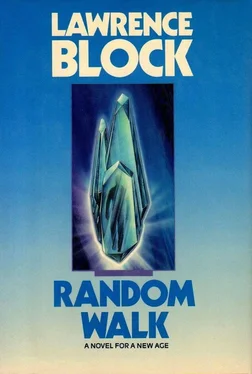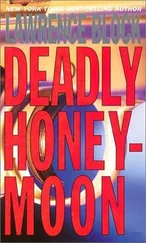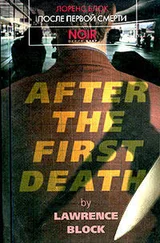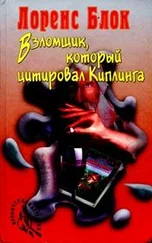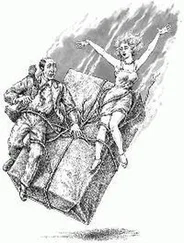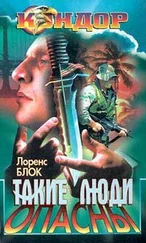“Not really.”
“Where are you going?”
“Heading east.”
“Uh-huh, and you don’t want to say more than that. You in any kind of trouble, Guthrie? Stupid question, if you are you don’t want to say, but are you, you know, short? You want to borrow a couple of bucks?”
“I just want to sell the car,” he said. “I’d take it to a dealer but I really don’t want the hassle. Whatever I got for it I’d worry I got screwed.”
“What do you want for it?”
“I don’t know. Whatever it’s worth.”
“You know the book on it?”
“It’s eight years old, I don’t think the book goes that far back.”
“Well, let’s look at it.” Outside, Harry walked around the car, started the engine and listened to it. He opened the hood, listened some more, slammed it shut. “I don’t really know what I’m looking at. How’s it run?”
“Drive it around the block.”
“Just tell me how it runs.”
“I think it runs okay. I had some transmission work done on it about six months ago. The tires aren’t bad. The spare’s bald but the rest are decent.”
“You got a lot of rust.”
“No kidding.”
“What do you want for it?”
“I don’t know. Five hundred bucks?”
“I don’t honestly know if that’s high or low. Be different if I needed it, but I really don’t. Shit. Three hundred?”
“All right.”
“No, that’s probably screwing you. Three hundred dollars, a bicycle’s three hundred dollars these days. More than that, even. Split the difference, four hundred. How’s that?”
“Better than three.”
All in all, he had twenty-three hundred dollars and change. He stashed an even two thousand in the money belt and centered it in the small of his back, adjusting the straps around his waist. He added an extra pair of jeans to his pack. There wasn’t room for much else, and he couldn’t think what he was forgetting.
Cigarettes. He had an open pack and two others, all amounting to perhaps a day’s supply. He went around the corner for a carton.
What else? He tried to think if there was anyone he had to call and decided there wasn’t. Roseburg was a small town; everybody at Paddy Mac’s would know tonight, and everybody else in town would know in a day or two.
The apartment? The rent was paid through the end of the month. By then, well, either he’d be back dealing with things or it would be somebody else’s problem. Because you could just walk away from things. They couldn’t make you come back for your clothes and books and records.
By three-thirty he was out of there. The pack rode easily on his back. The old Nikes — the new ones were packed — felt as comfortable as ever on his feet. The sun, obscured by clouds most of the day, was shining.
At the edge of town he stopped at a gas station to use the men’s room and fill his canteen. By four he was heading east on Route 138.
The duplex was just off Evans Avenue near the University of Denver. The upper and lower flats were identical, each running to around twelve hundred square feet, with three bedrooms and one and a half baths. The lower flat, where the owner and his family lived, had been better maintained than the upstairs rental unit, but when was it ever otherwise? The tenants, a young couple named Minnick, hadn’t abused the property too badly. They were graduate students with an infant son, and they’d made the third bedroom into a study, its walls given over entirely to bookshelves and bulletin boards, its floor space pretty much filled by a pair of desks improvised out of filing cabinets and plywood. They stood awkwardly like any tenants during a prospective buyer’s inspection, worried that they might have to move, afraid they might be blamed by buyer and seller alike for the condition of the property.
The husband was lean and gawky, with knobby wrists and a prominent Adam’s apple and a haircut that suggested his wife had taken up barbering as an economy, and a false economy at that. The wife was short, with a round face and round glasses that magnified her light brown eyes. A faded blue blouse was buttoned tight across her plump chest. Mark wondered if she was nursing the kid.
She wasn’t actually pretty, but there was something about her that stirred him.
Downstairs, he accepted a cup of instant coffee from the owner, a Mr. Bedrosian, and busied himself writing numbers on his yellow pad. He made Bedrosian wait awhile after he’d figured out what he was going to offer.
Then he said, “Well, it’s a nice piece of property, Mr. Bedrosian. I like what you’ve done with it.”
“It’s a sound house,” Bedrosian said. He’d said that before, more than once.
“But I’ll tell you,” Mark said, “I can’t quite see the numbers you came up with. Now if I’m going to create a positive cash flow for myself here, you’d have to show me some flexibility on the selling price and the financing.”
“I see,” Bedrosian said. In Mark’s experience, that was something people said when they didn’t.
“I’d like to buy her,” he went on. “And I think you genuinely want to sell—”
“No question about that.”
“—and if you’re a motivated seller, I think we can probably cut a deal that’ll work for both of us. As far as I’m concerned, the only good deal is one that’s good for all concerned. If you don’t win, I don’t win either.”
He actually believed this, and he was convinced this had more than a little to do with his success in real estate. At forty-two, he owned one-and two-family houses in four states, and his net worth was somewhere between four and five million dollars. He had accomplished all of this in, well, not quite eight years.
And he’d started with next to nothing. Eight years ago he’d been working for his wife’s father, selling hardware and pots and pans in a small store at a second-rate shopping mall in Topeka. Then he read one of those books, getting rich in real estate with no money down, and it was as if the book had been written with him and him alone in mind, as if the author had called him up and was telling him all of this over the phone. Everything was clear and simple; everything made perfect sense.
He did exactly what the book told him to do. Ten days after he read it he made his first offer for a house. It was turned down, but in the course of the following week he made a dozen more offers, and three of them were accepted. By the end of the first month he owned eight houses and was generating a positive cash flow from every one of them.
John Randall Spears, the man who wrote the book, traveled around the country teaching seminars and selling a set of audio tapes, and after he’d been in real estate for two years Mark attended one of the seminars. He got a few tips that made it worth his time, but most of what the man had to say was already spelled out in his book. Mark had read dozens of other books in the meantime, and had learned something from all of them, but you didn’t really need anything beyond that first book. If you read it and understood it and did exactly what it said, you would get rich.
“I give this seminar four times a week,” John Randall Spears had told them. “We’ve got two hundred men and women in the room tonight, and that’s about average. Last year twenty thousand people took this seminar. Now how many of them do you figure are getting rich?”
Maybe half, Mark figured. Or maybe that was high. Say a third, to be conservative.
“One in fifty,” Spears said. “One in fifty! That means four people in this room tonight are going to get rich and the rest of you are just getting another day older. And do you know what’s going to keep the rest of you stuck right where you are?” He pounded his fist into his palm. “Sitting on your butts! I’ll make a few predictions right now based on some of our data. Of the two hundred of you, sixty of you won’t even study the classified ads for more than a day or two. Maybe fifty of you’ll actually go and look at some properties. Fifteen or twenty of you’ll go so far as to make a written offer to purchase. Six or eight of you’ll keep on making offers until one of ’em’s accepted. And about four — that’s two percent — that’s one in fifty, just like I said — will keep on making offers and buying more property and those are the ones who’ll wind up rich. Now the rest of you” — and he shook his finger at them — “you can’t say you’re not getting your moneys worth out of what we’ve been doing here tonight. Because it’s entirely up to you whether you’re in that two percent winners circle. And, if you don’t get off your butt, if you don’t choose to go for it, you’ll still have gotten one thing out of it. For the rest of your life you can never really pretend you didn’t have a chance. You’ve got that chance. You’ll always have that chance, and every day you can take it or not take it.”
Читать дальше
